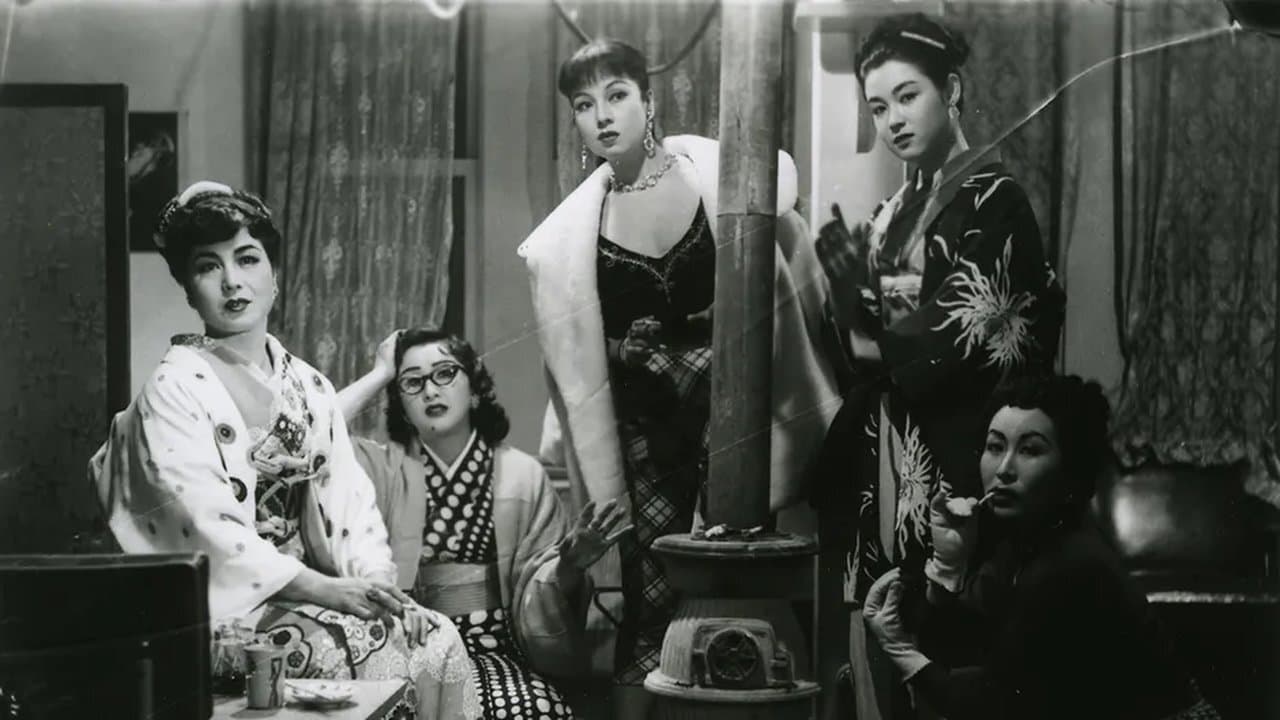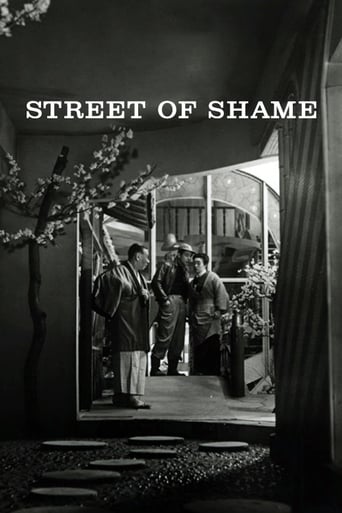WILLIAM FLANIGAN
Viewed on DVD. Restoration = ten (10) stars; subtitles = four (4) stars; score = one (1) star. Director Kenji Mizoguchi's "street" is little more than a small studio alley set. It is emblematic of the disconnect between the sensationalist title (as judged by Japanese standards of the time) and the reality of a dull, repetitive story line spiced up with "sexy" fragments of dialog and flashes of semi-nude female anatomy. "Shame" seems to be operating at three levels in this movie. There is the possible shame (underlined by the film's title) of working as a prostitute in a bordello; the real shame of being exploited by unscrupulous brothel owners who render their employees virtual sex slaves through financial trickery; and the sad shame of making such an insipid movie. The photo play seems to end rather abruptly (as though filming stopped when the money ran out?). Direction/editing is unexceptional. Acting is at or below average. As noted above, studio exterior sets are patently phony. Cinematography (narrow screen, black and white) and lighting are okay. (This film is, for once, in sharply-focused black and white rather than being rendered in fuzzy shades of gray as is typically used in the Director's other films about sex workers.) Subtitles are frequently too long and could benefit from some serious grammatical editing (there are also instances where the subtitle precedes the line delivery!). Audio is fine. "Music" is simply terrible and sounds like it was "composed" for a very, very low-budget horror movie! It serves as an ever present distraction and never fails to negatively impact a scene. (The theremin is employed here as the audio equivalent of cleaning your ears with barbed wire!) Recommended ONLY for the most hard-core Mizoguchi fans. WILLIAM FLANIGAN, PhD.
MisterWhiplash
One thing that sticks out like a wonderful, strange thumb in Kenzi Mizoguchi's (unintentional) swan song is the musical score by Toshirô Mayuzumi. With the exception of a couple of scenes, like when one of the older women working at the Dreamland whorehouse is found on the street by another of the women as she has left her husband, the music is far from being the usual melodramatic simple strings and flutes or whatever. The music for Street of Shame is warped, twangy, accentuated by the the playing of that weird one string instrument (if you've heard Jack Nietzche's score for One Flew Over the Cuckoo's Nest you know what I mean), not supplying the emotional context but observing it, setting an unusual tone for scenes that go between melodrama and naturalistic acting. The music by Mayzumi is sad but not the way you'd think; it perfectly puts us in a world that should be the "other" but there's something familiar about it, which fits since these characters, all women servicing clientèle to pay off debts and support their families, are here because it's a job, nothing more.The film itself is conventionally structured in terms of the ensemble: several women including Mickey, Yumeko, Yasumi, go through the few ups and the many downs of being a prostitute in a city and country that is very mixed about it. It's legal, but there's rumblings on the radio about a vote coming up about whether to ban it for, basically, the reasons it's illegal here in the United States (not too oddly though, prostitution became illegal shortly after the film was released). Mizoguchi handles the social strata of this with tact and care. It's not something that needs to be turned into a message-story, because the women themselves are the message. He leaves it up to the audience on whether to decide on it; at the least he doesn't paint any characters to be total monsters or caricatures, which include the Man and Madam of the Dreamland house are down the line businesspeople, offering these women a way to pay off debts in an atmosphere that the government doesn't really care about, "that they just talk and make money".But in leaving it up to the audience, he offers up a very strong case for how prostitution does, in a realistic setting, disrupt and break up lives, and curse some to their respective fates. In one plot line a girl dupes a businessman by asking him to pay off her BIG debts (i.e. 150,000 yen) with the fooled intent of marrying him; another, Mickey, is the bright and chipper one until her father comes to call bringing a whole volcanic scene that at the end she replies "what is this, a movie?"; an older woman working there keeps trying to call her son, only for him to split ways with her due to the shame it's caused him (he goes a little over the top explaining "the whole world knows", but it still works in that scene on the street); and a young mother of a baby has to find ways to help her sickened husband to get by.On the surface, these stories don't seem like they would make for a tragic mosaic of existential circumstance. But this is what it is, a movie that features so much life that it ultimately is very heartbreaking to watch. The women are all strong but there's that weakness that is brought on by society's double-standard: it's not seen as something acceptable to go about working in this business, but what else will the women do to work? Some may get married, but at what cost? Mizoguchi's triumph is in making it something Japanese society can relate to and contemplate, but firstly it's about character, about them being three-dimensional: fragile very deep down but with a veneer that says "yeah, this is what I am, whadda ya want?" Most touching of all, with the music included, is at the end when the young new girl (a virgin) is put to her first night on the job, with her looking on in a daze and awe on a booming-business night. It's really remarkable work by a master of his craft.
christopher-underwood
Fabulous film making, a really enjoyable and moving film, oh so beautifully shot. Every wondrous frame is a sight to behold and Mr Mizoguchi certainly knew how to exploit the 4:3 academy ratio and as it says in my booklet, don't dare watch it stretched on a widescreen TV. Set in Tokyo's red-light district of the time and against the background of political attempts to have prostitution made illegal, as well as everything else it is a tantilising glimpse of the mid fifties streets. Poverty and hypocrisy, along with the real need to literally pull those punters in. Always ravishing to watch there are additionally some stand out scenes and the controversial ending works splendidly for me with the electronic music preventing it becoming 'sentimental' or 'overplayed' as suggested by Keiko I McDonald in her 1984 biography of the director.
MartinHafer
I do not need every movie to have a pleasant ending or have characters I admire, though not having these certainly makes it more difficult for me to enjoy a movie. There are of course exceptions (such as The Seventh Seal or Adele H.--both very depressing movies with very difficult to relate to characters), but it certainly is an uphill battle."Streets of Shame" is about the post-WW2 movement to eliminate prostitution in Japan as seen from the perspective of women working in one whorehouse. As I eluded to above, it was hard to really care about most of the characters--many were quite selfish and had unattractive personalities. This isn't always the case in the movie (such as the young man who is angry at and resents his mother for prostituting herself to ensure a decent life for him), but generally I didn't find the individuals that compelling.It is true that prostitution has a very different stigma in Japan than in many Western countries and so I found this fascinating. However, to get a more compelling treatment of prostitution, try watching Kenji Mizoguchi's film, "A Geisha"--in which an UNWILLING woman is forced to a life of prostitution and desperation.

